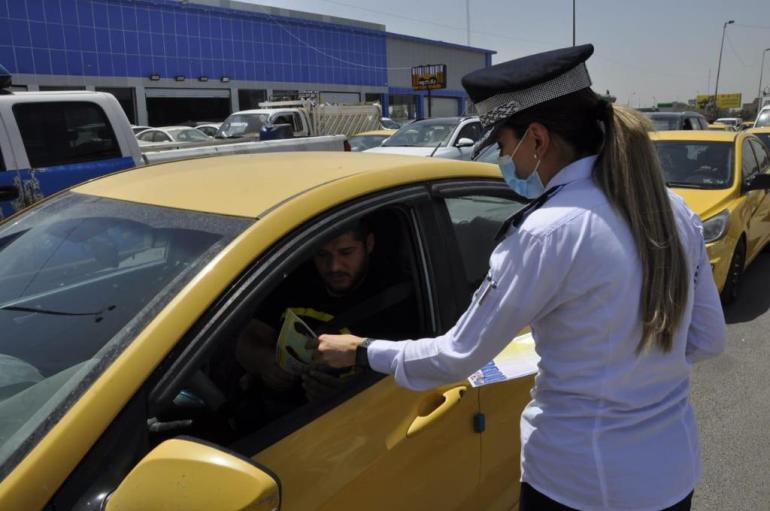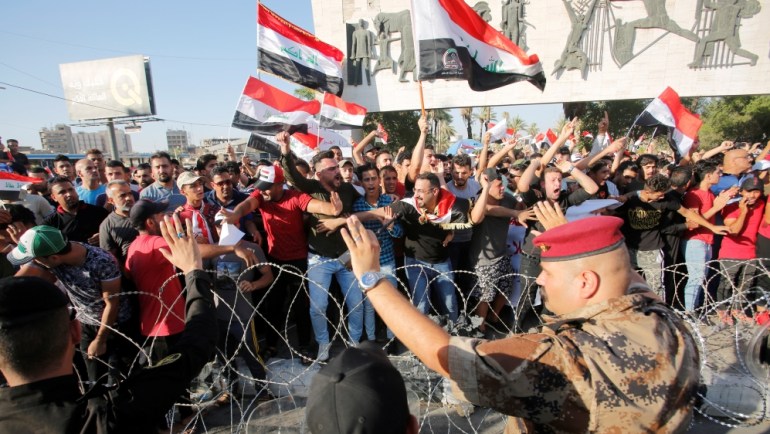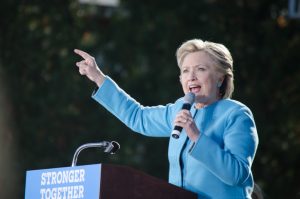[ad_1]
Baghdad, Iraq – When Saja al-Abayji joined the police academy, she was unsure about managing the stringent military-like drills, and anxious over society’s notion of ladies becoming a member of the police drive.
Her class in 2011 was solely the second to see a number of feminine officers graduate alongside a whole bunch of males who deliberate to serve within the Iraqi ministry of inside (MOI) to supervise policing and border management within the nation.
However a decade later, the 34-year-old is now a senior visitors officer, having served for years within the Common Site visitors Directorate within the Iraqi capital, Baghdad. As an alternative of being a part of a number of ladies in Iraq’s inner safety forces, al-Abayji is considered one of a whole bunch of feminine officers who’ve taken up quite a lot of roles in Iraq’s policing and border management.
Talking from her workplace in central Baghdad, al-Abayji stated because the variety of policewomen on the streets of Iraq grew over time, society slowly modified its conservative views on ladies’s function in regulation enforcement.
“Individuals thought ladies wouldn’t succeed within the police drive, believing that it wasn’t our place to be there. And so, we [female officers] acquired a lot of discouraging phrases,” stated al-Abayji, explaining many individuals noticed them as “intruders” within the discipline.
“However with time, society started to see issues in a special mild.”
Whereas Iraqi ladies have been world pioneers in all walks of life – drugs, engineering, and the humanities – and have served as authorities ministers and members of the army and civil service, the Iraqi MOI’s companies – the police, freeway patrol, visitors division, and border enforcement, to call just a few – didn’t have any feminine officers till a few decade in the past.

Path crammed with challenges
Al-Abayji stated a lot of her feminine friends dropped out of the Greater Institute for Safety and Administrative Improvement throughout their coaching on the police academy as a result of their households weren’t supportive of their profession selections.
“This mirrored the place society stood on the time on the subject of the function of ladies,” defined al-Abaiji, who fortunately discovered her biggest help from her household and fiancé on the time.
“Once I completed my diploma in pc science, it was my household and now husband who inspired me to use to the institute,” stated al-Abayji. “If it wasn’t for them, I wouldn’t have been ready to deal with all of the negativity round me.”
Regardless of this, al-Abayji discovered the street to turning into a police officer tough and stuffed with challenges.
“Initially, I by no means shared what I did with individuals I’d simply met. I additionally by no means wore my police uniform to and from work – not just for safety causes, but in addition as a result of I needed to cover,” she stated. “I simply didn’t need to be judged.
“However sooner or later, I requested myself why is society so pleased with the boys who do the very same job as me? I realised I’ve to confide in change individuals’s opinion,” she informed Al Jazeera.
The opposite important problem for al-Abayji was getting accustomed to her new function and duties.
When beginning her coaching on the institute, al-Abayji stated “the thought of dealing with a weapon and dressing in a masculine-looking uniform was very onerous.
“At college, I wore fairly skirts and heels,” stated al-Abayji. “Then abruptly I used to be doing army drills and studying to shoot a goal. It was an enormous shock to my system.”
Regardless of the challenges, al-Abayji stated as her bodily capability and confidence grew, her “keenness to succeed blossomed, too”, and she or he turned adamant to rise by way of the ranks.

Gradual change
Talking from his workplace in central Baghdad, spokesman Main-Common Saad Maan stated the inside ministry began encouraging ladies to hitch the inner safety forces in 2010, not just for what they may provide, but in addition to mirror the significance of increasing ladies’s public function in Iraq.
“The involvement of ladies has been efficient and needed and displays the progress and success of the ministry itself,” he defined.
Maan stated essentially the most elementary impediment ladies proceed to face as cops is the patriarchal tradition in society, which additionally exists throughout the ministry.
“Males within the police drive wrestle to handle feminine officers utilizing their given titles due to the patriarchy ingrained in them,” stated Maan.
Regardless of this, Maan stated there was general progress. “Initially, we begged ladies to volunteer on the drive. Now we obtain tens of 1000’s of candidates yearly.”

Trying forward
Esraa al-Saadi, a 32-year-old officer on the inside ministry’s media and public relations division, stated whereas ladies serving as cops had been initially confined to administrative roles, that is not the case.
“Now, ladies do every part and share duties that had been beforehand reserved for males,” stated al-Saadi, referring to feminine officers finishing up arrests, and collaborating in interrogations, investigations and searches.
Al-Saadi stated she has skilled this transformation first hand over the previous 5 years of her profession, including it boils right down to “Iraqi society turning into extra open and accepting of the police as a spot for girls, too”.
Whereas al-Abayji agreed society has come a great distance, she stated ladies within the police drive nonetheless must push additional to allow them to attain management positions.
“We’ve bought junior and senior feminine cops, however no ladies majors, lieutenants or brigadier generals,” stated al-Abayji. “My ambition is to sooner or later see my feminine friends turn out to be leaders within the Iraqi police drive. And so whereas we’re getting there, there’s heaps extra to do.”
Nonetheless, al-Abayji added: “Now, I stroll the streets of Baghdad in my uniform and folks have a good time and take satisfaction in what I do.”
Observe Arwa Ibrahim on Twitter @arwaib

[ad_2]










Leave a Reply